The story of how Kiran Mazumdar Shaw founded Biocon with a limited team and went on to become one of India's successful entrepreneurs is inspiring in itself.
Here, the 61-year-old entrepreneur shares interesting nuggets from her career journey that is sure to inspire you for the better.
I remember my mother telling me, grow up to become as graceful, self reliant and successful like Kiran Mazumdar Shaw.
For my mother, me and millions out there in India, Kiran is a role model in true sense.
She has created a place for herself in an industry which was not known to have women leaders.
What she had was sheer will, a spirit of daring and a dream to make a difference. And, she has done it all.
I lapped up the chance to meet her at her office recently, and what followed was a heartfelt conversation with a lady who impresses so much more in person.
She is jovial, fun and purposeful all rolled into one.
Please read this interview and find your own meanings as I found mine.
This is the first part of our conversation (it went on for more than an hour) and I will come out with more nuggets of wisdom from her shortly.
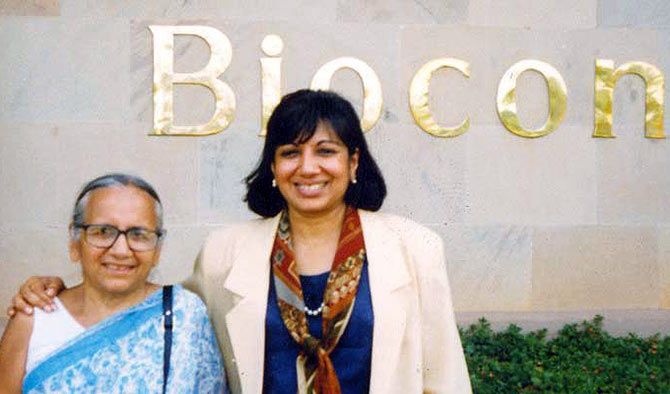
Image: Kiran Mazumdar Shaw (right) with her mother.
You've accomplished so much on your own. At this stage of your life, would you say there is a sense of completeness or is there still a sense of, you know, anxiety and hunger that a lot remains to be done? What is that sense that you have right now in life?
No entrepreneur feels that they have come to the end of the road.
I think an entrepreneur's life is always a continuous journey. And, it’s really about milestones, rather than, you know, having a final destination.
I think as an entrepreneur we know that.
We set off on a path not knowing where it will lead us. And therefore, we realise it's a voyage of discovery.
This voyage is very exciting because it takes us to unknown destinations and makes new paths for us. So, that’s the journey of all us entrepreneurs.
I think I’m no different.
I started off my entrepreneurial journey quite by chance.
In 1978, when I found that I could not pursue my dream of becoming a brew master and managing a brewery, I said 'okay then, what else can I do', and then I accidentally started this business.
I said 'Okay, it's biotech, biotech is definitely linked to brewing, this is an exciting area.'
I did not know anything about starting a business, because I’d never run a business. But it’s a voyage of discovery.
I thought, let me discover what this business journey is all about.
That’s how I took the plunge.
I started with making industrial enzymes, and a lot of those enzymes were actually designed for brewing.
I was quite familiar with that piece. That’s what gave me my raison d’etre and this sense that I am still connected with brewing.
So, my business also has a connection with the area, which I am very familiar with.
I think most entrepreneurs will start a business they feel they have some familiarity with, some understanding, because I don’t think entrepreneurs start a business without having a clue of what they’re doing.
I think it is extremely important that entrepreneurs have a deep-rooted interest in what they are doing, and should have a good understanding of what they are building.
I was very excited to do something that was path breaking.
It was a pioneering industry, and I was a pioneer because I had nobody to follow (laughs).
I had none to show me the way. Or, tell me what to do with this business.
Today you are showing the way to so many.
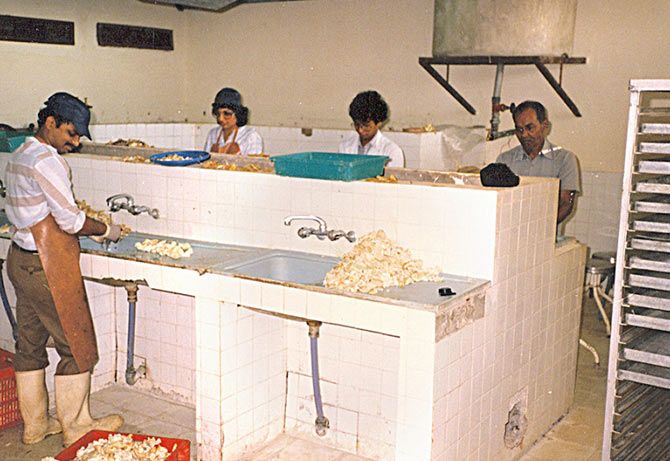
Image: Kiran Shaw (second from left) with her colleagues at Biocon
I remember in my college days we were told about you and how we should take your example and do something meaningful with our lives.
Looking back, I feel, yes, it was very courageous in a way because I had no idea what I was getting into.
I feel entrepreneurs are also, you know, people with guts, people who take risks, people who do not want everything laid out for them.
You're willing to struggle, you're willing to take up a challenge, but it's with a sense of purpose; my sense of purpose that time was to prove myself as a manager.
People told me, no we can't give you a job as a brewer, you’re a woman.
I was very determined to show that a woman can manage a business. Any business.
That was my sense of challenge, and my sense of purpose was about developing these enzymes and building a business out of biotechnology.
You have to have a spirit of challenge as an entrepreneur.
Something should drive you. So whether it’s a Flipkart, a Biocon or an Infosys, something has to drive you, that has to give you a sense of purpose and a spirit of challenge.
My spirit of challenge was that nobody had thought of building a business based on biotech.
I am going to show this is possible. I am going to show that women can run businesses and can manage businesses.
And my sense of purpose was, 'Oh! this sounds fascinating.'
You know, it was about greening businesses. That was a very new concept.
Saying how do we replace chemical technologies with enzyme technologies, and green the world. And that was my sense of purpose when I started.
It’s like when Infosys started. They had the sense of purpose which was really about starting a software services company. And they had the Y2K challenge.
They said no let’s show that we techies, we first generation entrepreneurs, can actually create a business out of this.
Everyone has a sense of purpose, a spirit of challenge.
And as you start building your business, obviously it's a voyage of discovery, you basically learn how to deal with the problems, you learn how to solve problems, you learn how to deal with business issues, with regulatory issues, all these things are very alien to you when you get into building a business.
Then you realise there is a formal process.
It is not just doing something in an ad hoc way.
There is a rationale to what you have to do. There is a strategy to what you do and so you slowly, sort of, learn on the job.
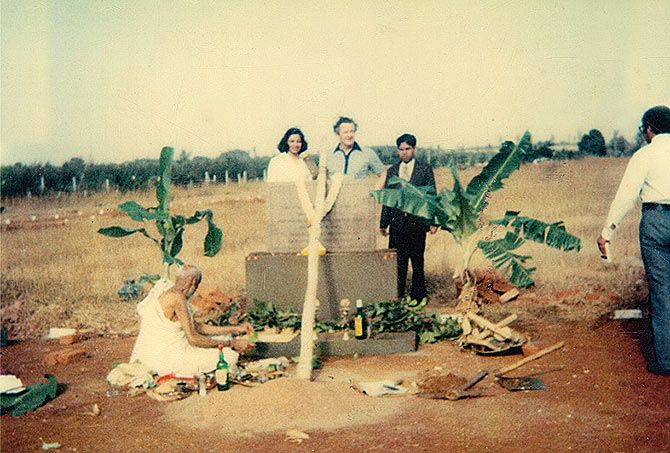
Image: Kiran at Biocon's foundation stone laying ceremony
Did you always know that you wanted to make something large, something big?
Well, in the beginning you don’t think about those things; some people do, but I didn’t.
My job was just to be successful in what I was doing.
I had no business background.
A lot of people come with a business background, so their understanding of rolling and managing and establishing a business is very different from someone like me, who was an absolute novice.
I had no business background, no business experience and I had never worked for a company where I had learnt business processes or had an understanding of what business processes are about.
So, I literally reinvented the wheel, I had to basically create my own learnings. I had to learn on the jobs so to speak.
Did you feel lonely?
No, I didn’t. Because when you have the spirit of challenge you never feel lonely.
You’re young, you know you have a lot of spirit in you, you want to get things done, and you’re willing to roll up your sleeves.
I was willing to do anything, I was fearless.
When I started my company, I didn’t have that kind of money, so I would travel the length and breadth of India in a train or on a bus.
I couldn’t afford a plane ticket.
I would go to all kinds of places using the most frugal ways to travel.
I remember my parents would get worried and say: 'You're a single girl, you're going on your own to all parts of India, to factories etc."
Those were very difficult times in Punjab with the Akali Dal etc. And yet I used to go on my own. I used to jump into a bus.
Most of my travel used to take me to the north those days as a lot of business opportunities were there.
I didn’t care, I was on a purpose and hence fearless.
Very often in those buses, I would be the only woman.
There would be all these guys staring at me, but the bus driver would be very concerned about me and he would say, 'Aap kahan ja rahi hai madam?' (Madam, where do you want to go?) and I would say, 'Mujhe woh Jagatjit industry pahunchaneka hai,' (I want to go to Jagatjit industry). That poor chap would stop the bus in front of the gate and say, you get down here.
I did not have money and it was fun to slog it out.
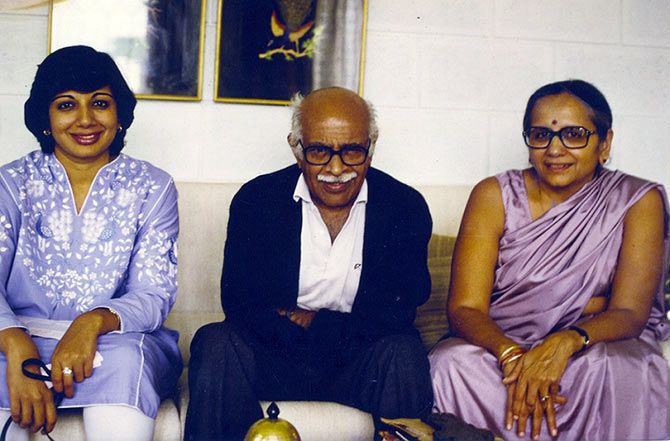
Image: Kiran Mazumdar Shaw with her parents
What has been the influence of your parents in shaping you to be the fearless person you are?
My parents had a great influence on me. My father was a man ahead of his times.
He would say to me just because you are my daughter doesn’t mean you shouldn’t have an aspiration to pursue a career.
In fact, I want you to pursue a career.
He was also a brew master and he wanted one of his children to be a brewer so he said, 'you do it'.
And I was like 'but I am a woman'.
And he said, 'Why shouldn’t you? It’s all in your mind. You can be a very good brew master.'
He had that kind of faith in me.
My father also taught me a lot of good values.
He used to say, 'I'll tell you something, there is good in every human being, and if you're a good manager you bring out the goodness in people.
'A good manager is someone who brings out the good in everyone. And it's for you as a manager to actually bring out that goodness.'
I always thought that was such a telling a piece of advice.
He also instilled high ethical values in me.
He used to say, 'There is no point in taking shortcuts, there is a good way of doing business and a not so good way of doing business. And I want my daughter to run her business in an honest way. And I want my children to have a very high sense of integrity in society.'
My mother was always there for me.
She believed in the same values as my father. She believes in self-reliance.
After my father passed away, my mother started her own venture to keep herself mentally engaged positively (she had never worked previously and was a home maker).
She runs her own business even at the age of 82.
She said to me, 'You know I read that Alzheimer's and Dementia happen to people who don’t keep their minds engaged and I want to keep myself really busy, and if I run a business, it will keep me fully engaged.' (Laughs fondly.)
Being a woman in business, successful entrepreneur and role model, what has it been from a gender lens? What would you tell all the upcoming women professionals out there?
When I went to Australia to do my brewing course I was on my own. I was the only woman in my class.
That was a very transformative time for me because I suddenly realised that I could stand on my own.
I could basically match one for one with men and with my male colleagues.
I topped the class even though the others had a lot of experience — they had all come from breweries.
It taught me that being a woman does not have to be a handicap or a disadvantage. Being a woman has actually helped me gain confidence.
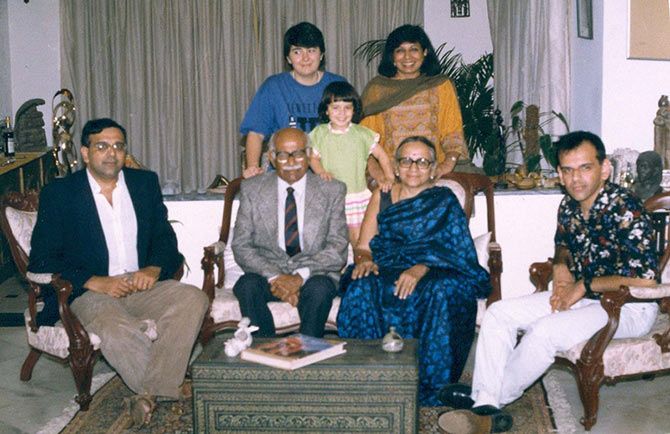
Image: Kiran Mazumdar Shaw with her family
I always tell women, it’s all in your mind. Why should you feel that because you are a woman you can’t do certain things? What can’t you do? Please tell me.
What I think you have to learn (and many of us out there) to do is to basically almost turn a deaf ear to criticism that makes you feel different, that makes you feel that because you’re a woman you’ll have problems.
I learnt to do this early on. I found myself in a position that I was technically very competent at, so it gave me a lot of confidence.
When I would go to breweries and I had to do business with brewers and technical people, I could speak their language.
And I could actually have a very engaging conversation with them, and I knew that quite a lot of the times, I had an upper hand because their technical knowledge was not as good as mine.
I worked on my strengths. Work on your strengths and take advantage of it.
I always say that as a woman if they treat you like, 'poor thing, you need help', then take the help (laughs).
You may not need it, but take it.
I remember I used to take full advantage in the government offices.
I used to go to the government offices for licenses.
I remember going to a senior bureaucrat and telling him, 'You know I'm feeling very intimidated.'
'Why?' he asked.
I replied, 'When I'm sitting in your corridor waiting for you to call me in, some of these real new fixers and all come and tell me, you have to bribe to get this permission. My God, I’m getting quite scared, if I have to bribe then I don't know whether I should run a business.'
The bureaucrat said, 'No, no, no…don't believe anybody, you don't have to bribe.'
I said, 'Oh great, I'm so happy then!'
He said, 'Now don’t sit in the corridor, from now you sit inside my room. Don't let people bug you. You don’t have to bribe at all.'
And the best part is that there are really good government people and folks out there.
We just need to learn to see it constantly.
You think everyone is bad, but it’s not like that.
I would say the majority of government people are very helpful, very good also.
I still remember, when I got my approvals, this poor chap sent me a telegram saying 'Congratulations, we've approved your company license.'
Similarly, in Bangalore every time I used to go to the industries, the secretary’s office, there would be a whole bunch of people, but I would always be asked first because I used to be the only woman there.
It’s a great advantage being a woman. We just need to see it differently.
And I never had to bribe. I would get all my stuff done.
My male colleagues would be like, we are very envious of you and it’s not fair, you never have to pay a bribe and we have to.
Once they told me, 'Oh this fellow, he’s a real corrupt guy, I challenge you, let me see how you will get away without paying this guy a bribe. He demands at least 10 per cent cut of the subsidy otherwise he will not even give you the cheque.'
And I would walk in and get the cheque without doing anything.
The guys would tell me, 'This is not fair, how come he gives it to you and not us.'
And I remember replying, 'Yeah because I’m a woman. He has no guts to ask me for bribe.'
'But I’ll tell you the real reason,' I said.
'I go personally and do all this work, you guys send your peons, your clerks, your subordinates. It serves you right.'
The moment you send in your subordinate, they will ask for money. But when you go on your own, who will ask you for money.
That’s a very important lesson that I taught myself and I am sharing it with you -- If you want things done, do it yourself.
My father also taught me one more thing, he said, when you ask for certain things from the government, don’t do it with a vested interest for yourself, do it with a vested interest for the entire sector.
I have learnt to do that, and today whenever I talk to the government, either the state government or central government, I don’t go and say Biocon needs you.
Maybe some of it Biocon doesn't even need, but I talk for the industry because I want the industry to grow.
Embrace this mindset of growth for all and see how growth embraces you in abundance.
In a way, I fully subscribe to what Prime Minister Narendra Modi is doing in terms of dealing with crony capitalism.
I’ve always had a lot of, you know, skepticism for this close nexus between industry and government.
I’ve seen too much, where industry is constantly trying to corrupt the government to get a few freebies for themselves.
I think that’s wrong.
I believe you have to do it for the whole sector so that whatever you’re asking for, let everybody benefit, not just you.
Although a lot of people might say Kiran is stupid, she doesn't realise how business works, but those are the values I've grown up with -- ask for everyone, not just yourself, and see how you can impact all.
Photographs Courtesy: Biocon.com












 © 2025
© 2025